You are here: Home»
News»
Global»
The Second AnnualChina - U.S. Entertainment Law ConferenceCame to a Success
The Second AnnualChina - U.S. Entertainment Law ConferenceCame to a Success
Date:2017-06-29
The 2nd Annual US-China Entertainment Law Conference, co-hosted by the United States Patent and Trademark Office (USPTO), Loyola Law School Los Angeles, Peking University LawSchool(PKU) and Beijing Film Academy ManagementSchool (BFA) was successfully held at Lecture hall on the first floor of Kai Yuan Building, Peking University on June 21, 2017. This conference revolved uponcutting-edgelegal issuesin the US-China entertainment industry and was aimed at deepening Sino-US entertainment law industry exchange and cooperation to promotemutual learning of entertainment lawbetween the two countries.
The conference was sponsored by Baidu Company, Sino-Cloud Culture in Big Data Technology Co., Ltd, Maradona International Brand Management Co., Ltd and Beijing Sapphire Law Firm.
Relevant government officials,academics, lawyers, corporate legal advisers and other guests from China and the United States were invited to discussintensively on six major issues: recent developments in China-U.S. entertainment industry, impacts of China’s IP environment on the development of entertainment sector, opportunities and challenges facing the collaboration and investment of entertainment sector, experiences and challenges in China-U.S. entertainment law practice , niche in theChina-U.S. entertainment industry and corresponding legal system, and potential changes in the China-U.S.
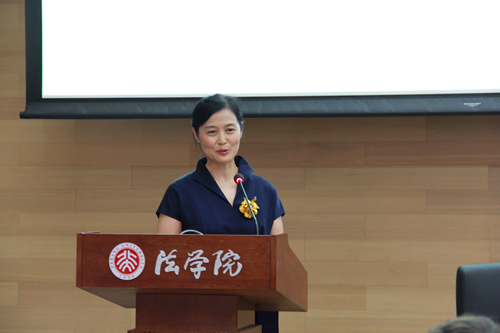
Zhang Ping, professor of Peking University Law School presided over the conference. Yu Aiqun, Director of Legal Affairs Department of the State Administration of Press, Publication, Radio, Film and Television of P.R.C, Joel Blank, Intellectual Property Attache? at US Embassy in Beijing, Seagull Haiyan Song, professor of Loyola Law School, Los Angeles, Wu Manfang, Dean of School of Management, Beijing Film Academy, Mark Cohen, Senior Counsel ofUnited States Patent and Trademark Office, and Zhang Shouwen, Dean of Peking University Law School all gave their remarks in the conference.
Yu Aiqun, Director of Legal Affairs Department of the State Administration of Press, Publication, Radio, Film and Television of P.R.C,said that the timing of the conference was well-chosen as the integration of entertainment industry and productivity, production factors led to thetransformation of entertainment industry and propelled it into skyrocketing surge. Entertainment law became a comprehensive legal departmentinvolving intellectual property, finance, labor, contracts, social law and other spheres. The entertainment industry should adapt to changing needs as it is the driving force of entertainment industry. The "People's Republic of China Cultural Industry Promotion Law", which was currently being drafted, was also designed to boost the industry.
Joel Blank, Intellectual Property Attache? at US Embassy in Beijing, said that movies, music, books and games provided us insights into different perspectivesof distinctive ideas and cultures. Legal regulation and market access facing entertainment industrymay affect or hinder the development of entertainment industry. China was revising the Copyright Law to offer better legal protection and regulation for the entertainment industry, including video games. Joel Blank envisioned that all countries and experts could communicate with each other using the uniform concept of entertainment law.
Seagull Haiyan Song, professor of Loyola Law School, Los Angeles, said that the trial cases involving publishing, music, television and films were increasing rapidly in recent years, which encompassednot only intellectual property rights, but also contracts, labor, antitrust, anti-unfair competition, rights of the person, personal image rights, privacy and other legal contents.
Wu Manfang, Dean of School of Management, Beijing Film Academy, said that the First Annual China - U.S. Entertainment Law Conference was held in Los Angeles last November, which builta new platform for legal cooperation between China and the United States. The fact that the conference moved to China would greatlyfacilitatethe development of the entertainment industry,international exchanges and cooperation, and overseas investment of two countries. It is not onlya hope but also a challenge for the colleagues of the entertainment industry in the two countriesto achievedeeper integration of two countries' entertainment industry under twodifferent legal systems and blaze the trail of reciprocal development.
Mark Cohen, Senior Counsel ofUnited States Patent and Trademark Office, said that the cultureexchange between China and Western world had a long history. Disney adapted the story of Mulan Hua into a film, Austrian composer Gustav Mahler blendedLi Bai's poems in his large symphony "Song of the Earth", and the song “Rose, Rose, I Love You” created in 1940 had been a hit in the United States. Mark Cohen hopedthat the protection of intellectual property couldcreate more opportunities and creative brains.
Zhang Shouwen, Dean of Peking University Law School, said that with the growing demand for cultural life, the cultureindustry, especially the entertainment industry was embracing unprecedented opportunities for development. The study of entertainment law involves different fields of law. Considering that entertainment law is related with multiple law departments, colleges and universities could make more contributions in personnel training, scientific research and social services to play the part of contemporary university.

Zhang Shouwen, Dean of Peking University Law School addressed the open ceremony

The second keynote speech was moderated by Neil Graham, Attorney Advisor of USPTO. Seagull Haiyan Song, professor of Loyola Law School, Los Angeles, Yang Ming, professor of Peking University Law School, Yang Jing, Director of Research Office, Beijing Intellectual Property Court, Yan Bo, Deputy Director, Copyright and Legal Affairs Office of CCTV, Song Haining, Partner of Jun He LLP, Eric Priest, professor of Oregon University School of Law deliveredtheir own speeches with the theme of "IP Issues in the US-China Film, Television, Music and Gaming Industries". They elaborated on issues like latest development of Chinese entertainment law, the boundary of copyright in live studio streaming, IP disputes in entertainment law development, copyright protection of live broadcasting, the exercise of part owners’ copyright, the differentiation and integration of music royalty market, etc.
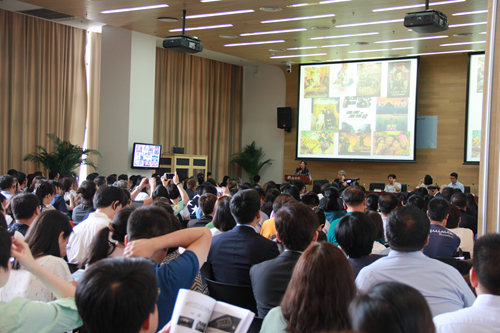
Second Keynote Speech
Lunch talk session was moderated by Li Ran, Dean of International Exchange School, Beijing Film Academy. Justin Hughes, professor of Loyola Law School, Los Angeles and Manfred Wong, Film producer, Director and Scriptwriter, Former Chairman of the Hong Kong Film Awardsparticipated in the dialogue. The discussions were about IP boom, thechanges of China's entertainment industry, future developmentof China's film industry and other topics.

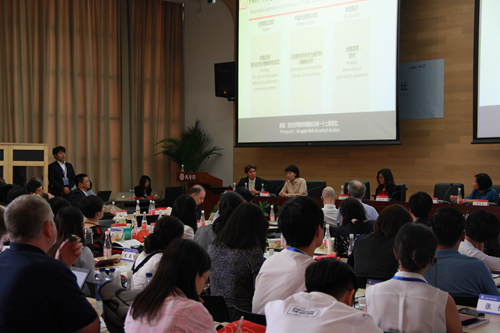
The Third Keynote Speech
The fourth roundtable discussion was moderated by Mark Cohen, Senior Counsel of USTPO.Zhang Ping, professor pf Peking University Law School, Sheri Jeffrey, partner of Hogan Lovells LLP, Tan Jian, CTO of Sino-Cloud Culture in Big Data Technology Co., Ltd, Mathew Alderson, partner of Harris Bricken, Jin Hongzhou, CEO of TimeVale, He Shengwen, Managing Partner of Beijing Sapphire Law Firm discussed around the challenges and opportunities of the entertainment industry. The topics discussed included the impact of technological changes on the entertainment industry, the development trend of Sino-foreign cooperative production, the diversification of the income sources of the film industry, the application of the pre-indictment and the injunction in the judicial practice, the accountability of copyright infringement, the development of the entertainment economy of the elder and other issues.
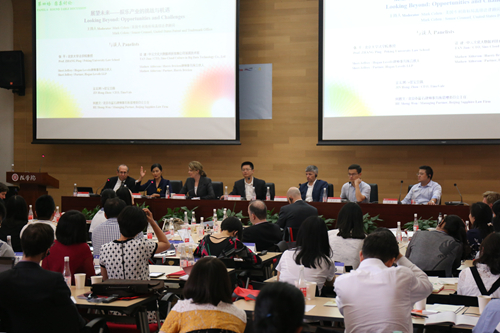
Fourth, Rround-Table Discussion
The closing ceremony of the forum was moderated by Zhang Ping, professor of Peking University Law School.Pan Jianfeng, Party Chief of Peking University Law School, Mark Cohen, Senior Counsel of United States Patent and Trademark Office, and Seagull Haiyan Song, professor of Loyola Law School, Los Angeles, addressed the closing ceremony.
Pan Jianfeng, Party Chief of Peking University Law School congratulated on the spectacular success of the conference. Pan Jianfeng pointed out that entertainment law wasone of the major toolsto solve the relevant social problems brought by the entertainment industry. Entertainment law is closely related withthe constitution, civil law, intellectual property law, civil law, labor law and other laws. The conference like today was a success that is worth continuing.

Mark Cohen, the US Patent and Trademark Office, said that this event is historic and thank you for your contribution to this meeting and looks forward to continuing to communicate with you at later reception.
Seagull Haiyan Song, professor of Loyola Law School, Los Angeles, extended her gratitude to allguests for coming to the conference and welcomedthem to attend the nextAnnual China - U.S. Entertainment Law Conference for further exchanges and cooperation.
After the closing of the conference, all participants came to the Peking University Gridsum Courtyard to continue their conversations.
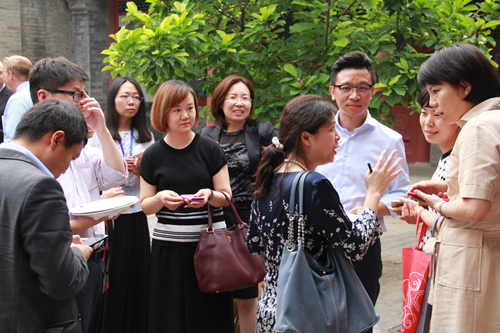
The conference was sponsored by Baidu Company, Sino-Cloud Culture in Big Data Technology Co., Ltd, Maradona International Brand Management Co., Ltd and Beijing Sapphire Law Firm.
Relevant government officials,academics, lawyers, corporate legal advisers and other guests from China and the United States were invited to discussintensively on six major issues: recent developments in China-U.S. entertainment industry, impacts of China’s IP environment on the development of entertainment sector, opportunities and challenges facing the collaboration and investment of entertainment sector, experiences and challenges in China-U.S. entertainment law practice , niche in theChina-U.S. entertainment industry and corresponding legal system, and potential changes in the China-U.S.

Zhang Ping, professor of Peking University Law Schoolat opening ceremony entertainment law.
Zhang Ping, professor of Peking University Law School presided over the conference. Yu Aiqun, Director of Legal Affairs Department of the State Administration of Press, Publication, Radio, Film and Television of P.R.C, Joel Blank, Intellectual Property Attache? at US Embassy in Beijing, Seagull Haiyan Song, professor of Loyola Law School, Los Angeles, Wu Manfang, Dean of School of Management, Beijing Film Academy, Mark Cohen, Senior Counsel ofUnited States Patent and Trademark Office, and Zhang Shouwen, Dean of Peking University Law School all gave their remarks in the conference.
Yu Aiqun, Director of Legal Affairs Department of the State Administration of Press, Publication, Radio, Film and Television of P.R.C,said that the timing of the conference was well-chosen as the integration of entertainment industry and productivity, production factors led to thetransformation of entertainment industry and propelled it into skyrocketing surge. Entertainment law became a comprehensive legal departmentinvolving intellectual property, finance, labor, contracts, social law and other spheres. The entertainment industry should adapt to changing needs as it is the driving force of entertainment industry. The "People's Republic of China Cultural Industry Promotion Law", which was currently being drafted, was also designed to boost the industry.
Joel Blank, Intellectual Property Attache? at US Embassy in Beijing, said that movies, music, books and games provided us insights into different perspectivesof distinctive ideas and cultures. Legal regulation and market access facing entertainment industrymay affect or hinder the development of entertainment industry. China was revising the Copyright Law to offer better legal protection and regulation for the entertainment industry, including video games. Joel Blank envisioned that all countries and experts could communicate with each other using the uniform concept of entertainment law.
Seagull Haiyan Song, professor of Loyola Law School, Los Angeles, said that the trial cases involving publishing, music, television and films were increasing rapidly in recent years, which encompassednot only intellectual property rights, but also contracts, labor, antitrust, anti-unfair competition, rights of the person, personal image rights, privacy and other legal contents.
Wu Manfang, Dean of School of Management, Beijing Film Academy, said that the First Annual China - U.S. Entertainment Law Conference was held in Los Angeles last November, which builta new platform for legal cooperation between China and the United States. The fact that the conference moved to China would greatlyfacilitatethe development of the entertainment industry,international exchanges and cooperation, and overseas investment of two countries. It is not onlya hope but also a challenge for the colleagues of the entertainment industry in the two countriesto achievedeeper integration of two countries' entertainment industry under twodifferent legal systems and blaze the trail of reciprocal development.
Mark Cohen, Senior Counsel ofUnited States Patent and Trademark Office, said that the cultureexchange between China and Western world had a long history. Disney adapted the story of Mulan Hua into a film, Austrian composer Gustav Mahler blendedLi Bai's poems in his large symphony "Song of the Earth", and the song “Rose, Rose, I Love You” created in 1940 had been a hit in the United States. Mark Cohen hopedthat the protection of intellectual property couldcreate more opportunities and creative brains.
Zhang Shouwen, Dean of Peking University Law School, said that with the growing demand for cultural life, the cultureindustry, especially the entertainment industry was embracing unprecedented opportunities for development. The study of entertainment law involves different fields of law. Considering that entertainment law is related with multiple law departments, colleges and universities could make more contributions in personnel training, scientific research and social services to play the part of contemporary university.

Zhang Shouwen, Dean of Peking University Law School addressed the open ceremony
The first roundtable discussion was hostedby Seagull Haiyan Song, professor of Loyola Law School, Los Angeles. Liu Chuntian, Dean of Intellectual Property Academy, Renmin University of China, Wu Manfang, Dean of School of Management, Beijing Film Academy, Gao Si, Deputy Director of Legal Affairs Department of State Administration of Press, Publication, Radio, Film and Television of P.R.C., ANG KT, Regional Director for Asia, International Federation of the Phonographic Industry, Hong Kong, Liu Ping,Deputy Director General & General Counsel, Music Copyright Society of China and Vivian Peng, Director of Content Protection, Motion Picture Association of America (China), Tan Jun, General Manager, Legal Department of Baidu, attended the roundtable discussion about the new developments in China-US entertainment, includingannual entertainment law events, measures to protect the copyright of sports events broadcasting programs, analysisof the lowgrowth of last year's Chinese box office, utilization of the music industry growth momentum and other issues.

First, Round-Table Discussion
The second keynote speech was moderated by Neil Graham, Attorney Advisor of USPTO. Seagull Haiyan Song, professor of Loyola Law School, Los Angeles, Yang Ming, professor of Peking University Law School, Yang Jing, Director of Research Office, Beijing Intellectual Property Court, Yan Bo, Deputy Director, Copyright and Legal Affairs Office of CCTV, Song Haining, Partner of Jun He LLP, Eric Priest, professor of Oregon University School of Law deliveredtheir own speeches with the theme of "IP Issues in the US-China Film, Television, Music and Gaming Industries". They elaborated on issues like latest development of Chinese entertainment law, the boundary of copyright in live studio streaming, IP disputes in entertainment law development, copyright protection of live broadcasting, the exercise of part owners’ copyright, the differentiation and integration of music royalty market, etc.

Second Keynote Speech
Lunch talk session was moderated by Li Ran, Dean of International Exchange School, Beijing Film Academy. Justin Hughes, professor of Loyola Law School, Los Angeles and Manfred Wong, Film producer, Director and Scriptwriter, Former Chairman of the Hong Kong Film Awardsparticipated in the dialogue. The discussions were about IP boom, thechanges of China's entertainment industry, future developmentof China's film industry and other topics.

Lunch Talk
The third keynote speech was moderated by Duncan Willson,Attorney Advisor, USPTO. Lin Ziying, Chief judge, Intellectual Property Division of Beijing Chaoyang District Court, Duncan Willson, Attorney Advisor, USPTO, Lisa WANG, General Counsel of Huayi Brothers, QIU Shao-lin, Senior Legal Counsel of Tencent, CHOW Lee-Peng, Vice President Legal China, NBCUniversal International, ZHOU Jun-Wu, Partner of JT&N Law Firm delivered keynote speechesrespectively on the theme of "Other Legal Issues in the Film, Television, Music and Gaming Industries". The contents of the speeches included legal protection of commissioned work for hire, US protection of celebrity names, risk management offilm production and distribution contracts in Chinese Film & Television companies, legal issues related with game licensing, commercialization of IP, talent agency contract dispute resolution.

The Third Keynote Speech
The fourth roundtable discussion was moderated by Mark Cohen, Senior Counsel of USTPO.Zhang Ping, professor pf Peking University Law School, Sheri Jeffrey, partner of Hogan Lovells LLP, Tan Jian, CTO of Sino-Cloud Culture in Big Data Technology Co., Ltd, Mathew Alderson, partner of Harris Bricken, Jin Hongzhou, CEO of TimeVale, He Shengwen, Managing Partner of Beijing Sapphire Law Firm discussed around the challenges and opportunities of the entertainment industry. The topics discussed included the impact of technological changes on the entertainment industry, the development trend of Sino-foreign cooperative production, the diversification of the income sources of the film industry, the application of the pre-indictment and the injunction in the judicial practice, the accountability of copyright infringement, the development of the entertainment economy of the elder and other issues.

Fourth, Rround-Table Discussion
The closing ceremony of the forum was moderated by Zhang Ping, professor of Peking University Law School.Pan Jianfeng, Party Chief of Peking University Law School, Mark Cohen, Senior Counsel of United States Patent and Trademark Office, and Seagull Haiyan Song, professor of Loyola Law School, Los Angeles, addressed the closing ceremony.
Pan Jianfeng, Party Chief of Peking University Law School congratulated on the spectacular success of the conference. Pan Jianfeng pointed out that entertainment law wasone of the major toolsto solve the relevant social problems brought by the entertainment industry. Entertainment law is closely related withthe constitution, civil law, intellectual property law, civil law, labor law and other laws. The conference like today was a success that is worth continuing.

Pan Jianfeng, Party Chief, Peking University Law School,addressed the closing ceremony
Mark Cohen, the US Patent and Trademark Office, said that this event is historic and thank you for your contribution to this meeting and looks forward to continuing to communicate with you at later reception.
Seagull Haiyan Song, professor of Loyola Law School, Los Angeles, extended her gratitude to allguests for coming to the conference and welcomedthem to attend the nextAnnual China - U.S. Entertainment Law Conference for further exchanges and cooperation.
After the closing of the conference, all participants came to the Peking University Gridsum Courtyard to continue their conversations.

Cocktail Reception
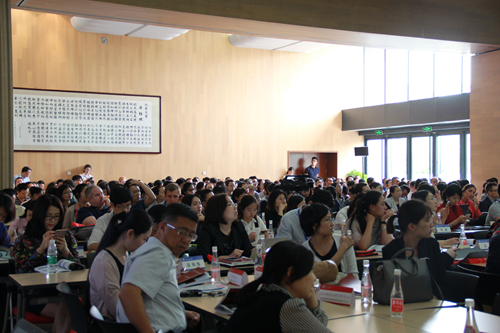
The meeting panoramic

The meeting panoramic
Pictures/Li Jun, Article/Wang Cong
Translator: Duan Yangfan
Organizing Committeeof the Second Annual China - U.S. Entertainment Law Conference



